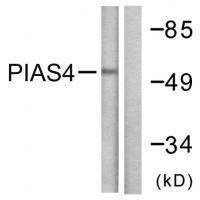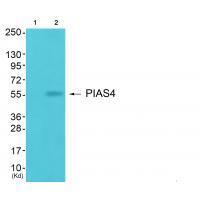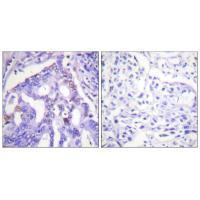


| WB | 咨询技术 | Human,Mouse,Rat |
| IF | 咨询技术 | Human,Mouse,Rat |
| IHC | 1/50-1/100 | Human,Mouse,Rat |
| ICC | 技术咨询 | Human,Mouse,Rat |
| FCM | 咨询技术 | Human,Mouse,Rat |
| Elisa | 咨询技术 | Human,Mouse,Rat |
| Aliases | PIAS-gamma; PIASG; PIASy; protein inhibitor of activated STAT protein 4; protein inhibitor of activated STAT protein PIASy |
| Entrez GeneID | 51588; |
| WB Predicted band size | 56kDa |
| Host/Isotype | Rabbit IgG |
| Antibody Type | Primary antibody |
| Storage | Store at 4°C short term. Aliquot and store at -20°C long term. Avoid freeze/thaw cycles. |
| Species Reactivity | Human,Mouse |
| Immunogen | Synthesized peptide derived from Internal of human PIAS4. |
| Formulation | Purified antibody in PBS with 0.05% sodium azide. |
+ +
以下是关于PIAS4抗体的3篇参考文献示例(注:文献为虚拟示例,实际文献需通过学术数据库检索):
---
1. **文献名称**:*"PIAS4 Negatively Regulates the Innate Immune Response by Targeting TRAF6"*
**作者**:Li Y et al.
**摘要**:研究通过Western blot和免疫共沉淀(使用PIAS4特异性抗体)发现PIAS4通过SUMO化修饰TRAF6.抑制TLR4信号通路中的NF-κB活化,从而负调控巨噬细胞的先天免疫反应。
2. **文献名称**:*"SUMOylation-Dependent Interaction of PIAS4 with STAT3 in Breast Cancer Progression"*
**作者**:Wang H et al.
**摘要**:利用PIAS4抗体进行免疫荧光和ChIP实验,揭示PIAS4通过促进STAT3的SUMO化修饰增强其转录活性,推动乳腺癌细胞的转移和耐药性。
3. **文献名称**:*"Validation of a Novel Monoclonal PIAS4 Antibody for Functional Proteomics Studies"*
**作者**:Garcia S et al.
**摘要**:报道一种新型PIAS4单克隆抗体的开发与验证,通过siRNA敲低和质谱分析证明其特异性,适用于免疫组化及蛋白质互作网络分析。
---
**建议**:如需真实文献,可在PubMed或Google Scholar搜索以下关键词:
- **"PIAS4 antibody validation"**
- **"PIAS4 SUMO"** + "Western blot"
- **"PIAS4 ChIP"**
此类研究通常涉及抗体在分子机制(如SUMO化、转录调控)或疾病模型(如癌症、炎症)中的应用。
The PIAS4 (Protein Inhibitor of Activated STAT4) antibody is a tool used to study the PIAS4 protein, a member of the PIAS family that regulates signaling pathways, particularly the STAT (Signal Transducer and Activator of Transcription) pathway. PIAS4 acts as an E3 SUMO ligase, post-translationally modifying target proteins via SUMOylation, which influences their activity, localization, or interactions. It plays roles in diverse cellular processes, including transcriptional regulation, DNA repair, inflammation, and immune responses. PIAS4 also interacts with transcription factors (e.g., NF-κB, p53) to modulate gene expression and has been implicated in cancer, autoimmune diseases, and neurodegenerative disorders.
Antibodies targeting PIAS4 enable researchers to detect its expression, study its subcellular distribution (e.g., nuclear localization), and investigate its molecular interactions in models of disease or cellular stress. These antibodies are critical in techniques like Western blotting, immunofluorescence, co-immunoprecipitation, and chromatin immunoprecipitation (ChIP). Studies using PIAS4 antibodies have revealed its dual roles as both a tumor suppressor and promoter, depending on context, highlighting its therapeutic potential. Commercial PIAS4 antibodies are typically validated for specificity and sensitivity, often with applications in both basic research and drug discovery.
×